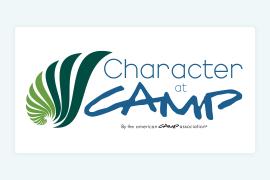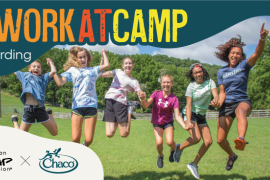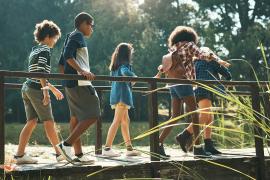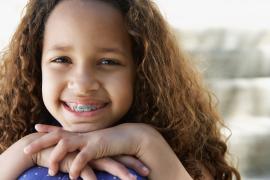Ideas from the Healthy Camps Initiative
As we near the summer season, the camping industry has been focused on the very important issue of COVID-19 as a collective trauma impacting individuals and communities. While COVID-19 care measures are important, we should not lose sight of other important camp considerations. We encourage camps to take a “multimuscle” approach to the summer.
Physical Muscle
Camps have consistently shown to be a place that provides a healthy experience for campers and staff (Garst et al., 2013). During summer 2021, camp professionals should expand their considerations of physical health, as individuals may have decreased physical fitness for the summer experience. We have not been as physically active due to remote work, distance/computer-based learning, reduction of extracurricular activities, and reduced opportunities for basic high-energy play (Hall et al., 2021). Camps may want to re-examine their activity schedule. Instead of jumping right into a regular schedule, a slower more staggered approach may help rebuild everyone’s stamina. Camps should look out for early signs of fatigue and address accordingly to limit negative outcomes.
In Australia, a noticeable increase of youth drownings occurred during their summer season, which may relate to over-estimated personal strengths (personal communication). Limited availability of swim lessons and less physical activity may create a situation where our campers and/or staff arrive without the expected skills and reduced self-awareness. We recommend camps that provide certain skill-based activities (e.g. swimming, horseback riding) take the opportunity to automatically assess all campers’ and staff skill levels. Whether new or returning, an individual’s actual skill level may not match the information listed on the intake form.
Social Muscle
For the past year, reading facial expressions has been masked or delayed through virtual interactions. Conversational skills may have deteriorated from the loss of social circles and in-person exchanges. Making friends, navigating new social experiences, and general communication skills have all been touched by the COVID-19 experience. Regardless of the initial program structure (e.g. cohorting), camps may want to also reintroduce basic social skills during that time. Practices such as taking turns, sharing, and listening as other’s speak may seem basic. However, campers and staff may have used these skills less often during the pandemic. Camps should be prepared to provide more guidance for campers and staff with relearning friendly, courteous behaviors.
Emotional Muscle
Many people learned a variety of coping skills throughout the pandemic, as stress levels varied across populations. Some populations may now be displaying the effects of trauma-type experiences while others have adopted beneficial self-care practices they wish to keep using. For any population, camps will want to learn what self-care practices, if any, campers and staff are using now, in a non-camp environment. Some of these self-care practices may not be conducive to a camp environment such as a child going to their individual room, closing the door, and playing a video game or the staff member that disengages from others or leaves a situation to be alone. Knowing these current self-care practices allows camp professionals to help their staff and campers adapt, and/or brainstorm new strategies, for the camp environment.
Environmental Muscle
Beyond the immediate health of our campers, don’t forget the actual environment. The camp’s property may have had little, or limited, use this past year. Reduced use may mean plants and animals had the opportunity to encroach into an environment that was previously maintained and managed. Ticks, nuisance bugs and critters like chipmunks and skunks, and robust growth of noxious plants like poison ivy/oak are possible. As camps prepare their sites for the start of the season, camp professionals, maintenance and property personnel will want to assess the environment beyond buildings and systems. Human and nature interactions may be more challenging after a year of limited interaction on our camp properties.
Leadership Muscle
In recent months, camp professionals, have been focused on providing a safe and healthy summer experience. In 2021, providing quality camp leadership will require a diverse understanding of the impact of trauma and a more specific understanding of the staff at camp – how they work, accommodate, and manage personal stress. New or returning leadership team members may be a bit “rusty”. The leadership team may need more coaching to get back up-to-speed and/or understand how to lead others that have differing COVID-19 experiences. Camps may consider creating a re-onboarding process for their leadership team to re-introduce camp expectations, preferred techniques, and opportunities for practice.
There are many muscles that camps engage every summer. Pre-pandemic, camps may have approached their preparation from a focus on activities, themes, and staff engagement. Beyond the pandemic’s one-year mark, camp professionals are encouraged to prepare using a “multimuscle” approach. Feeding our body, mind, and spirit this summer with a camp experience will be a building process that is worth holistic attention.
References
Garst, B. A., Erceg, L. E., & Walton, E. (2013). Injury and illness benchmarking and prevention for children and staff attending U.S. camps: Promising practices and policy implications. Journal of Applied Research on Children: Informing Policy for Children at Risk, 4(2), 1–25.
Hall, G., Laddu, D. R., Phillips, S. A., Lavie, C. J., & Arena, R. (2021). A tale of two pandemics: How will COVID-19 and global trends in physical inactivity and sedentary behavior affect one another? Progress in Cardiovascular Diseases, 64, 108.
Photo courtesy of Everwood Day Camp in Sharon, Massachusetts
Megan Owens, PhD, is an Assistant Professor in the Department of Recreation, Park and Tourism Administration at Western Illinois University. She has designed, implemented, evaluated, and advised a variety of summer camp programs. Megan’s work with camps supports her current role at WIU preparing students to enter the youth development field. Her research focuses on youth social-emotional learning skills in camp. She is a member of the ACA Healthy Camp IV Committee.
With a history of year-round camp nursing work and deep involvement with ACN and ACA, Linda E. Erceg, RN, MS, PHN, continues to write, consult, and do research to make healthier camp communities a growing reality. Her work to improve health outcomes for campers and staff is a good compliment to the Healthy Camps initiative, something she’s been involved with since its inception.
Barry Garst, PhD, is an Associate Professor of youth development leadership at Clemson University and the former director of program development and research application with ACA. His applied research focuses on critical and emerging issues within out-of-school time settings such as summer camp. Recent projects have explored parent anxiety associated with camp experiences and factors impacting injuries and illnesses among camp participants. He is a member of the ACA Healthy Camp IV Committee.
Tracey Gaslin PhD, CPNP, FNP-BC, CRNI, RN-BC, is a professor and dual certified nurse practitioner in pediatrics and adults. She holds a PhD in Educational and Organizational Leadership. Dr. Gaslin periodically works as a camp consultant and legal consultant and has spent 25 years in special needs camping. She currently serves as the Executive Director of the Association of Camp Nursing and is a member of the ACA Healthy Camp IV Committee.
Alli Faricy is a lifelong camp kid who now pretends to be an adult by directing Camp Foley in Northern, Minnesota. She is a member of the ACA Healthy Camp IV Committee, the LCOL Chair of ACA Northland and serves as a Youth Mental Health First Aid Instructor.




